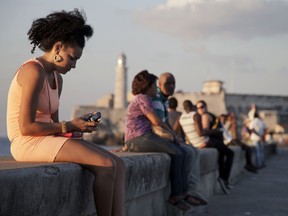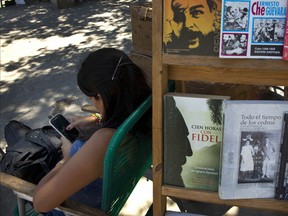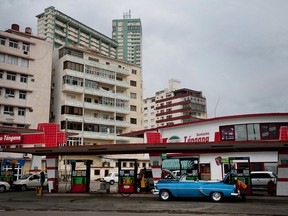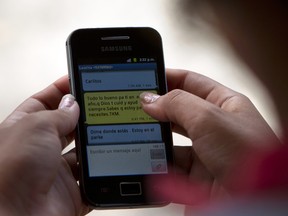Mark Hubbies Twitter Beef and Dairy Network
How U.S. secretly built 'Cuban Twitter' network to stir unrest and undermine communist regime
The U.S. hoped dissidents would use the social media service to organize mass protests and 'renegotiate the balance of power between the state and society'

The U.S. government masterminded the creation of a "Cuban Twitter" — a communications network designed to undermine the communist government in Cuba, built with secret shell companies and financed through foreign banks, The Associated Press has learned.
The project, which lasted more than two years and drew tens of thousands of subscribers, sought to evade Cuba's stranglehold on the Internet with a primitive social media platform. First, the network would build a Cuban audience, mostly young people; then, the plan was to push them toward dissent.
Yet its users were neither aware it was created by a U.S. agency with ties to the State Department, nor that American contractors were gathering personal data about them, in the hope that the information might be used someday for political purposes.
It is unclear whether the scheme was legal under U.S. law, which requires written authorization of covert action by the president and congressional notification. Officials at the USAID would not say who had approved the program or whether the White House was aware of it. The Cuban government declined a request for comment.
USAID administrator Rajiv Shah said Thursday that it was not a covert program, though "parts of it were done discreetly" in order to protect the people involved. Mr. Shah said on MSNBC that a study by the U.S. Government Accountability Office found the project to be consistent with the law.
"This is simply not a covert effort in any regard," he said.
USAID and its contractors went to extensive lengths to conceal Washington's ties to the project, according to interviews and documents. They set up front companies in Spain and the Cayman Islands to hide the money trail and recruited CEOs without telling them they would be working on a U.S. taxpayer-funded project.
"There will be absolutely no mention of United States government involvement," according to a 2010 memo from Mobile Accord Inc., one of the project's creators. "This is absolutely crucial for the long-term success of the service and to ensure the success of the Mission."
The project, dubbed "ZunZuneo," slang for a Cuban hummingbird's tweet, was publicly launched shortly after the 2009 arrest in Cuba of American contractor Alan Gross. He was imprisoned after travelling repeatedly to the country on a separate, clandestine USAID mission to expand Internet access using sensitive technology that only governments use.
The social media project began development in 2009 after Washington-based Creative Associates International obtained a half-million Cuban cellphone numbers. It was unclear how the numbers were obtained, although documents indicate they were done so illicitly from a key source inside the country's state-run provider. Project organizers used those numbers to start a subscriber base.

ZunZuneo's organizers wanted the social network to grow slowly to avoid detection by the Cuban government. Eventually, documents and interviews reveal, they hoped the network would reach critical mass so that dissidents could organize "smart mobs" — mass gatherings called at a moment's notice — that could trigger political demonstrations, or "renegotiate the balance of power between the state and society."
The Cuban government has a tight grip on information, and the country's leaders view the Internet as a "wild colt" that "should be tamed." ZunZuneo's leaders planned to push Cuba "out of a stalemate through tactical and temporary initiatives, and get the transition process going again toward democratic change."
At a 2011 speech at George Washington University, Secretary of State Hillary Rodham Clinton said the U.S. helps people in "oppressive Internet environments get around filters." Noting Tunisia's role in the Arab Spring, she said people used technology to help "fuel a movement that led to revolutionary change."
Suzanne Hall, then a State Department official working on Ms. Clinton's social media efforts, helped spearhead an attempt to get Twitter founder Jack Dorsey to take over the ZunZuneo project. Mr. Dorsey declined to comment.

The estimated $1.6-million spent on ZunZuneo was publicly earmarked for an unspecified project in Pakistan, public government data show, but those documents don't reveal where the funds were actually spent.

ZunZuneo's organizers worked hard to create a network that looked like a legitimate business, including the creation of a companion website — and marketing campaign — so users could subscribe and send their own text messages to groups of their choice.
"Mock ad banners will give it the appearance of a commercial enterprise," one written proposal said. Behind the scenes, ZunZuneo's computers were also storing and analyzing subscribers' messages and other demographic information, including gender, age, "receptiveness" and "political tendencies." USAID believed the demographics on dissent could help it target its other Cuba programs and "maximize our possibilities to extend our reach."
For more than two years, ZunZuneo grew and reached at least 40,000 subscribers. But documents reveal the team found evidence Cuban officials tried to trace the text messages and break into the ZunZuneo system. USAID said ZunZuneo stopped in September 2012 when a government grant ended.
"It was such a marvelous thing," said Ernesto Guerra, a Cuban user who never suspected his beloved network had ties to Washington. "The moment when ZunZuneo disappeared, [it] was like a vacuum. In the end, we never learned what happened. We never learned where it came from."
The Associated Press
Source: https://nationalpost.com/news/how-u-s-secretly-built-cuban-twitter-network-to-stir-unrest-and-undermine-communist-regime

0 Response to "Mark Hubbies Twitter Beef and Dairy Network"
Post a Comment